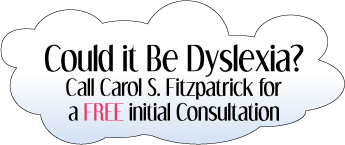Historical Perspective
Before the National Institutes of Health began their research in the 1980’s, the only definition of dyslexia was an exclusionary one. If a child’s difficulty with reading could not be explained by low intelligence, poor eyesight, poor hearing, inadequate educational opportunities, or any other common problem, then the child must be dyslexic.
That definition was not satisfactory to parents, teachers, or researchers. So here are three different definitions in use today.
Simple Definition
Dyslexia is an inherited condition that makes it extremely difficult to read, write, and spell in your native language—despite at least average intelligence.
Formal Research Definition used by the National Institutes of Health
Dyslexia is a specific learning disability that is neurological in origin. It is characterized by difficulties with accurate and/or fluent word recognition, and by poor spelling and decoding abilities. These difficulties typically result from a deficit in the phonological component of language that is often unexpected in relation to other cognitive abilities and the provision of effective classroom instruction. Secondary consequences may include problems in reading comprehension and reduced reading experience that can impede growth of vocabulary and background knowledge.
Revised Formal Definition from the International Dyslexia Association
Dyslexia is a neurologically-based, often familial, disorder which interferes with the acquisition and processing of language. Varying in degrees of severity, it is manifested by difficulties in receptive and expressive language, including phonological processing, in reading, writing, spelling, handwriting, and sometimes in arithmetic. Dyslexia is not the result of lack of motivation, sensory impairment, inadequate instructional or environmental opportunities, or other limiting conditions, but may occur together with these conditions. Although dyslexia is lifelong, individuals with dyslexia frequently respond successfully to timely and appropriate intervention.
Definition of “Learning Disability”
“Learning Disability” is not a specific term; it is a category containing many specific disabilities, all of which cause learning to be difficult. The following definition of “learning disability” is used for legislative, financial, and educational purposes only. It is not a definition of dyslexia, which is one specific learning disability.
The term “learning disability” means a disorder in one or more of the basic processes involved in understanding spoken or written language. It may show up as a problem in listening, thinking, speaking, reading, writing, or spelling or in a person’s ability to do math, despite at least average intelligence. The term does not include children who have learning problems which are primarily the result of visual, hearing, or physical handicaps, or mental retardation, or emotional disturbance, or of environmental, cultural, or economic disadvantage.
(Information above from Susan Barton’s website Bright Solutions for Dyslexia)


